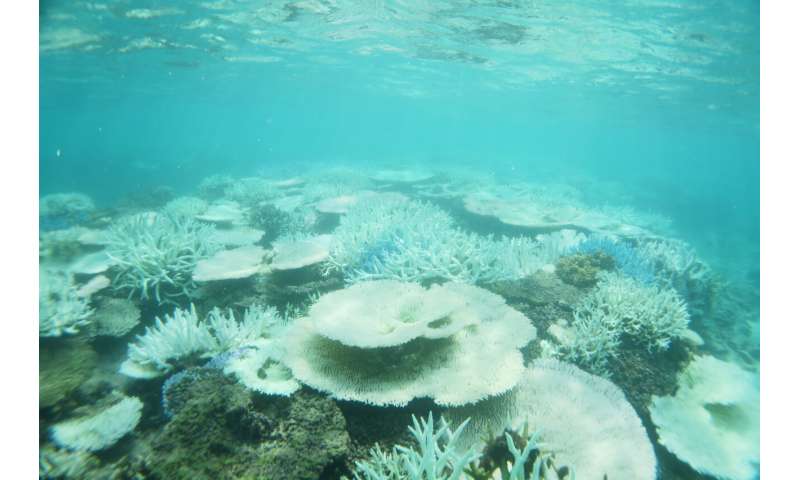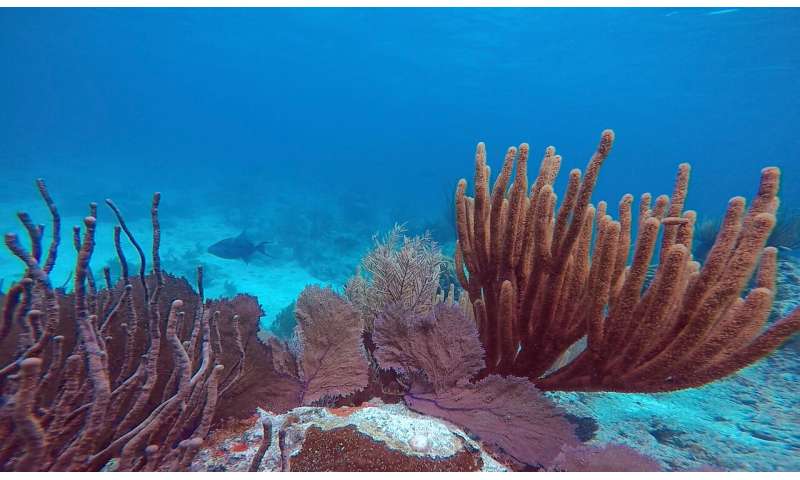#Warmer, acidifying ocean brings extinction for reef-building corals, renewal for relatives
“#Warmer, acidifying ocean brings extinction for reef-building corals, renewal for relatives”

Stony corals—the type that build massive reefs that support complex marine ecosystems—take up minerals from the water to construct hard skeletons from a form of calcium carbonate known as aragonite. Other corals, such as sea fans and black corals, build their softer skeletons from protein or calcite (a less soluble form of calcium carbonate), whereas sea anemones have no skeleton at all.
Working with an international team of researchers, including Gabriela Farfan, the National Museum of Natural History’s Coralyn W. Whitney Curator of Gems and Minerals, Quattrini and colleagues found that stony corals did not arise until conditions favored the construction of their aragonite skeletons—periods of aragonite seas, when ocean temperatures were relatively cool. During periods of calcite seas, when carbon dioxide is more abundant in the atmosphere and oceans are more acidic, evolution favored anemones and corals that built their skeletons from protein or calcite.
Notably, it was these other anthozoans that fared best after reef crises—times when up to 90% of reef-building organisms died off as oceans warmed and became more acidic. “Our study showed that after these reef crises, we actually get an increased diversification of anthozoans in general, particularly those that can do well under these climate conditions—ones that aren’t producing aragonite and aren’t making big reefs,” Quattrini said.
That is consistent with observations from today’s reefs, which are threatened by climate change and other human activities. “Current ecological studies have shown that when stony corals die off, these other anthozoans start to colonize dead coral and prosper,” Quattrini said. “We actually see that in our evolutionary tree, too.”

“Unfortunately, although these softer-bodied species may adapt better to climate change than stony corals, they don’t form large reefs,” McFadden said. “So, in the future, reefs may be replaced by different marine communities. This already appears to be happening in the Caribbean where stony corals are being replaced by ‘forests’ of sea fans.”
Today, about 1,300 species of stony coral inhabit the ocean, favored by aragonite sea conditions. But rising levels of carbon dioxide in the atmosphere are warming and acidifying the waters, making them less hospitable for these and other organisms whose shells and skeletons are made from aragonite. “Aragonite is expected to dissolve under ocean acidification,” Quattrini said. “As our seas are becoming more acidic and warmer, it’s likely that the skeletons of corals will dissolve or not be able to grow.”
The new study suggests that as the climate changes, these ecosystems may also see increased diversification of anthozoans without aragonite skeletons. Nevertheless, loss of reef-building corals will have devastating consequences for communities who depend on reefs and the rich, complex ecosystems they support for fishing, shoreline protection and tourism. “Corals have suffered extinctions in the past when climate has posed challenges, and we’ll likely see that in the future,” Quattrini said. “The best way to protect them is to curb our carbon emissions.”
“This study shows us how nature through evolution is able to adapt, survive and reinvent itself, so when hard corals are not able to survive, their soft-bodied relatives such as sea anemones will thrive instead,” Rodríguez said. “The question is whether we will be able to adapt and reinvent ourselves once nature, as we currently know it, is not there anymore.”
More information:
Palaeoclimate ocean conditions shaped the evolution of corals and their skeletons through deep time, Nature Ecology and Evolution (2020). DOI: 10.1038/s41559-020-01291-1 , www.nature.com/articles/s41559-020-01291-1
Warmer, acidifying ocean brings extinction for reef-building corals, renewal for relatives (2020, August 31)
retrieved 31 August 2020
from https://phys.org/news/2020-08-warmer-acidifying-ocean-extinction-reef-building.html
This document is subject to copyright. Apart from any fair dealing for the purpose of private study or research, no
part may be reproduced without the written permission. The content is provided for information purposes only.
If you want to read more Like this articles, you can visit our Science category.
if you want to watch Movies or Tv Shows go to Dizi.BuradaBiliyorum.Com for forums sites go to Forum.BuradaBiliyorum.Com